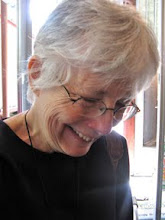There was a cryptic statement early on in the book about her missing the "hunger high". That got my attention, in light of my personal Lenten discipline to fast on a regular basis. Was there really such a thing as getting high from being hungry? (Inquiring minds want to know.)
But then I speculated on my ongoing inability to ever exercise enough to reach the stage where endorphins are supposed to make you feel all warm and fuzzy, as opposed to irritable and sweaty, which is my experience with exercise of most any variety.
Still… an intriguing thought.
It didn't happen. Maybe I never got hungry enough. I was definitely hungry enough to feel empty, to feel a hole in my abdomen wanting to be filled. I was hungry enough to feel light-headed and sometimes slightly nauseated, but certainly not high. I know what high feels like, or should I say I remember distinctly what high felt like back when pot was available and cool. And I know what an alcohol buzz feels like.
I never felt either one. Of course that wasn't the point of fasting. The point was to experience hunger. Unwanted hunger. To create a condition, if only approximately, of what it's like to be poor. To relate to poverty in a way that a white middle-class nun never really can. I'm not even sure if that was successful. After all, it was self-imposed; I was able to eat if I wanted to. And sometimes I was so busy, so involved with a project that I could have cared less. I generally get hungry when I'm bored. And this has not been a boring Lent.
I did lose some weight. But that was probably more the moratorium on bread than my one day of fasting a week. All in all, a bust.
And yet… I experienced how the street vendor smells of cooking food are kicks in the teeth when your stomach is empty. I felt the wistful longing to stop and admire pastries in the bakery window, knowing I could not go in and buy one, whether the reason was money or discipline. I felt more like sharing. That's something.



